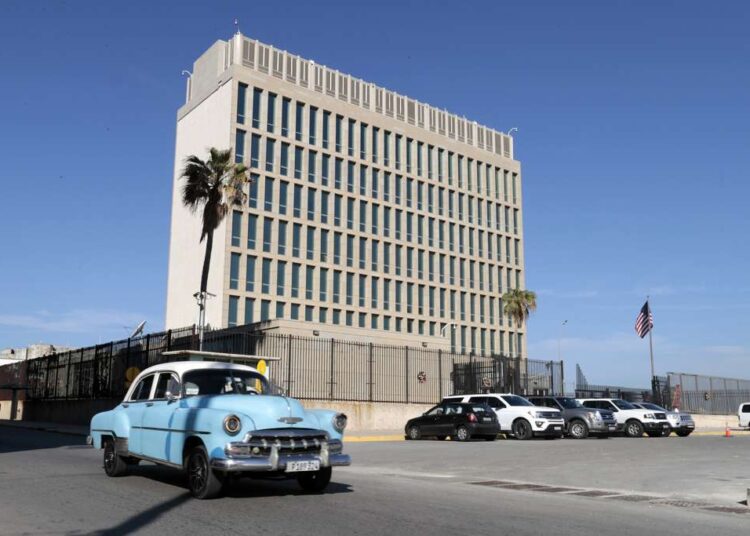In what they describe as “an abundance of caution,” the U.S. National Institutes of Health (NIH) archived the investigations into the so-called “Havana syndrome.”
The alleged disease reported in 2016, in the Cuban capital, and then extended to numerous cities around the world, has been supported by a series of U.S. spies, soldiers, and diplomats.
So far, after several multidisciplinary medical investigations, in which Cuban experts did not participate, nor did they have access to the clinical records, the cases continue without a firm diagnosis.
In a statement, the NIH announced it was ending the work “out of an abundance of caution” after an internal investigation found that people had been coerced into participating in the research, CNN reported.
The NIH did not offer any clues as to who may have been coerced into participating but noted that voluntary consent is a cornerstone of ethical research conduct.
Some of the people who reported being ill said the CIA forced them to participate in the research as a prerequisite for receiving medical care.
“They wanted us to be a lab rat for a week before we received treatment at Walter Reed, and at the very least, that is unethical and unmoral,” Marc Polymeropoulos told CNN in May.
Polymeropoulos, a former CIA official who says he has been ill, is an advocate for those affected by what the U.S. government calls “anomalous health incidents.”
In May, he said he believed his participation in the research was “ordered” by senior CIA officials, but the espionage agency had already denied this in a statement in March.
No clinical evidence
NIH researchers examined the brains of people believed to have the syndrome and found no consistent evidence of lesions. There were also no significant differences between that group and a healthy control group.
In a second study, NIH scientists performed a battery of tests on 86 U.S. government employees and family members who reported having “Havana syndrome,” and compared them to 30 people who had similar jobs but did not have the symptoms.
On most clinical and biomarker measures, they found the two groups were equal.
In an editorial published in the journal JAMA, Dr. David Relman, a professor of microbiology and immunology at Stanford who worked on the investigations of allegedly affected patients, argued that although the study, which included brain scans, appeared to show that “nothing, or nothing serious” was happening with these cases, reaching that conclusion “would not be advisable.”
CIA opinion
In an interim report, the Central Intelligence Agency assesses that Havana syndrome is unlikely to be due to a “sustained global campaign” by a foreign country.
The disease was dubbed Havana syndrome because it emerged in late 2016 in the Cuban capital. Some U.S. diplomats reported symptoms consistent with head trauma, including dizziness and extreme headaches.
Since then, at least 1,500 cases have been recorded among U.S. personnel stationed in 96 countries, officials said last year.
There has long been speculation about a new type of weapon causing these illnesses, but the U.S. intelligence community said last year that it could not link any cases to a foreign adversary.
It also ruled out that the unexplained illness was the result of a campaign directed by an enemy of the United States, the CNN report detailed.
Cuban scientific community, report
In September 2021, a group of experts from the Cuban Academy of Sciences presented an assessment of the unidentified health incidents and flatly rejected the narrative construed by the U.S. authorities as “established truth.”
At a press conference, Dr. Mitchell Valdés-Sosa, general director of the Cuban Neurosciences Center, said that the investigations examined all the material presented on the subject by the U.S. side.
The data was subjected to evaluation by Cuban experts in audiology, neurology, neurophysiology, neuroimaging, epidemiology, internal medicine, psychiatry and psychology.
Experts in telecommunications, bioengineering, biology, biophysics and physics were also consulted.
“It includes a detailed analysis, in close consultation with international experts on the claim made by the U.S. Academies of Sciences that ‘microwaves’ caused health problems,” said Valdés-Sosa, a scientist of international renown who has been involved in neuroscience since the 1960s.
Syndrome’s political drift
In September 2017, the Trump administration opened a major diplomatic crisis by ordering the withdrawal of more than half of its non-essential diplomats from Cuba, as well as their families, under the pretext of sonic attacks against these employees. It also advised its citizens not to travel to the island.
A few days later, it expelled 15 Cuban diplomats from the United States, to “equalize the operating capacity of the diplomatic headquarters in the respective capitals,” according to the State Department.
The aftermath of the crisis opened by Trump outlives the Republican government. The successor Biden administration took almost four years to progressively reestablish consular services in Havana but in a restricted way.
It offers only limited nonimmigrant visa services and processes all categories of immigrant visas. Routine B1/B2 Nonimmigrant visa services remain suspended.
U.S. Intelligence: no evidence of adversaries behind “Havana Syndrome”
To do so, thousands of Cubans on the island who have relatives, friends or interests in the United States are forced to travel, with no guarantee of success, to Georgetown, the capital of Guyana, and be processed there by the U.S. embassy for a B1/B2 visa.
Regarding this new report, Miguel Díaz-Canel wrote from X that “The false Havana syndrome no longer supports studies, but the media forgets to mention that it was the vile pretext to include Cuba on the list of sponsors of terrorism and reinforce the genocidal blockade with more than 240 measures.”










